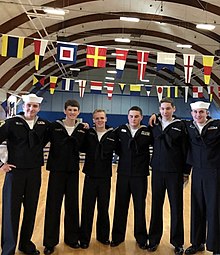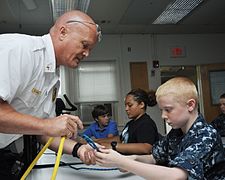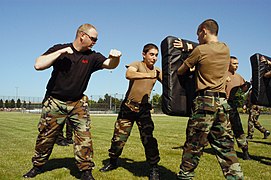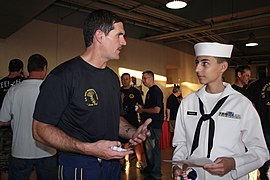United States Naval Sea Cadet Corps
This article has multiple issues. Please help improve it or discuss these issues on the talk page. (Learn how and when to remove these messages)
|
| United States Naval Sea Cadet Corps | |
|---|---|
 | |
| Founded | 1958 |
| Country | |
| Size | 396 units and 12,002 members (2,871 officers and 9,131 cadets) |
| Garrison/HQ | Arlington County, Virginia, U.S. |
| Motto(s) | "Chart your course" |
| Colors | Sea Cadet Blue and Gold |
| Anniversaries | 10 September 1962 (federal incorporation) |
| Website | [1] |
| Commanders | |
| Executive Director | RADM Andrew Lennon, USN (Ret.) |
The United States Naval Sea Cadet Corps (USNSCC or NSCC) is a congressionally chartered, U.S. Navy–sponsored organization that serves to involve individuals in the sea-going military services, U.S. naval operations and training, community service, citizenship, and teach an understanding of discipline and teamwork. The USNSCC is composed of two programs: the Navy League Cadet Corps (NLCC), which is for cadets ages 10–13, 5th grade through 8th grade; and the senior program (NSCC), which is for cadets ages 13–18 (March 1st of the year they complete 8th grade).
History
[edit]

The NSCC was founded in 1958 by the Navy League of the United States at the request of the Department of the Navy. In 1962, the USNSCC was chartered under Title 36 of the United States Code as a non-profit youth organization with an emphasis towards the sea-going services of the United States.[1]
In 2000, the U.S. Congress stated that the NSCC and related programs "provide significant benefits for the Armed Forces, including significant public relations benefits."[2] Although under no service obligation, a sizeable percentage of cadets later enlist in the military.[clarification needed] Members who attain the grade E-3 or Seaman/Airman or are in the program for 2 years, may enter as an advanced paygrade of E-3 if they join the Navy before they turn 24 years old,[3] and E-2 in the Marine Corps or other services, due to the training they receive.[citation needed]

U.S. Navy training activities include, but are not limited to:[4]

- Amphibious operations training
- Shipboard training
- Coast Guard
- FAA ground school
- JAG legal training
- MAA (Master at Arms, the Navy equivalent to military police) law enforcement academy
- POLA (petty officer leadership academy)
- Seabee (naval construction battalions)
- Submarine seminar (basic and advanced)
- USN seamanship academy
- Firefighting and damage control school
- Port operations
- Honor guard school
- Field medical school (corpsman)
- Cybersecurity training
- Joint Special Operations Command training
- SEAL training
- SWCC (special warfare combat crewman) or "special boats"
- EOD (explosive ordnance disposal) training
- AIRR (naval helo search and rescue swimmer) training
- Advanced music training
- Land navigation training
- Field operations training
- Homeland security training
- Search and rescue training
- Marksmanship training
- Expeditionary warfare training
- Maritime interdiction
- International exchange program
- Photojournalism
- Scuba
- Naval Criminal Investigative Service training
- Coastal riverine training
- Locally arranged training
- Lifeguard
- U.S. Naval Academy summer seminar
- Online trainings were hosted but now is obsolete


The USNSCC owns a ship, the USNSCS Grayfox, homeported in Port Huron, Michigan. The USNSCC also sponsors an International Exchange Program with other Sea Cadet programs around the world: exchange countries include the United Kingdom, Canada, Australia, Belgium, Germany, the Netherlands, New Zealand, South Korea, India, Japan, Singapore, South Africa, Sweden, Hong Kong, Russia, and Bermuda.[5]
The Band of the West (BOTW) is a 30-member martial music team which is the only active marching band in the USNSCC.[6] The band has been trained by the top military bands in the nation including the United States Navy Band, Marine Band San Diego and the 101st Army Reserve Band.[7]
Uniforms
[edit]As of 10 January 2020 the U.S. Navy has authorized the NWU III Uniform to be worn by Cadets, Midshipmen, Instructors and Officers of the USNSCC. The NWU III uniform worn by the NSCC/NLCC is modified with official USNSCC/USNLCC tapes, shoulder flashes and 8-point cover flash. The only footwear authorized for wear with the NWU III is a black combat style boot. Coyote, Tan and Black "rough out" boots are not authorized for the NSCC.[8][9]
Rates
[edit]Warrant officers are adult leaders who have received direct appointments into the USNSCC Officer Corps. Warrant Officers wear a modified navy warrant officer's (W-2) uniform appropriately marked with the NSCC Insignia. Warrant Officers normally serve a specific function or head a department within the unit and remain in the grade of Warrant Officer, however, may become an Ensign in the normal path of advancement after one year of service if they choose to do so. Candidates for Warrant Officer do not have to complete the Officer/Midshipman Study Guide prior to appointment, but have to have obtained the rank of E-6 or higher in any branch of the Armed Forces, serve 1 year as an instructor, and have a special skill, or speciality in the unit's operation.[10][dead link]

Advancement and promotion
[edit]Cadets
[edit]| Rank | Correspondence course | Training | Time in rate | Time in service | Exam | Approval authority |
|---|---|---|---|---|---|---|
| Recruit Candidate / RC | Recruit Candidate | N/A | 12 Drills | N/A | RO Personnel Qualification Standards (PQS) | Commanding officer |
| SC-1 Seaman recruit / SR |
Polaris advancement course
E-1: Seaman Recruit (SR) |
N / A | N / A | N / A | Basic Military Requirement Booklet | Commanding officer |
| SC-2 Seaman apprentice / SA |
Polaris advancement course E-2: Seaman Apprentice (SA) |
NSCC recruit training | 3 months in NSCC | 3 months | N / A | Commanding officer |
| SC-3 Seaman / SN OR Airman / AN |
Polaris advancement course E-3: Seaman (SN) OR Airman NAVEDTRA 14014A |
NSCC recruit training
& Advanced training (Minimum 7 days) |
6 months as SC-2 | 9 months | N / A | Commanding officer |
| SC-4 Petty officer 3rd class / PO3 |
Petty officer 3rd and 2nd class NAVEDTRA-14504 |
Advanced training (Minimum 7 days) | 6 months as SC-3 | 15 months | PO3 exam | Commanding officer |
| SC-5 Petty officer 2nd class / PO2 |
Petty officer 3rd and 2nd class NAVEDTRA-14504 |
Advanced training (minimum 7 days), must have graduated from POLA (Petty Officer Leadership Academy) | 6 months as SC-4 | 21 months | PO2 exam | Commanding officer |
| SC-6 Petty officer 1st class / PO1 |
Petty officer 1st class NAVEDTRA-14145 |
Advanced training (minimum 7 days) | 6 months as SC-5 | 27 months | PO1 exam | NSCC executive director |
| SC-7 Chief petty officer / CPO |
Chief petty officer NAVEDTRA-14144 |
Advanced training (minimum 7 days) Staff RT (effective 1 September 2008) Be 16 years of age |
6 months as SC-6 | 33 months | CPO Exam | NSCC executive director |
Adult officers
[edit]| Rank | Course | Training | Time in service | Other requirements |
|---|---|---|---|---|
| Midshipman Midshipman (MIDN) |
NSCC Officer/Midshipman Study Guide | N / A | N / A | NSCC E-3 or above, or ROTC. between ages 18-21 |
| Instructor Instructor (INST) |
NSCC Officer/Midshipman Study Guide | N / A | N / A | at least 21 years of age |
| Warrant officer Warrant officer (WO) |
NSCC officer / Midshipman Study Guide Complete OPD101 |
Escort one Basic or one Advanced Training as an INST. | Serve a minimum 1 year as an INST. | Must have reached E-6 or above in military, at least 35 years of age |
| O-1 Ensign (ENS) |
NSCC Officer / Midshipman Study Guide Complete OPD101 |
Escort one Basic or one Advanced Training as an INST. | One year as MIDN or INST One year in NSCC |
N / A |
| O-2 Lieutenant, junior grade (LTJG) |
Complete OPD 201 | Escort one Basic or one Advanced Training as an ENS | 2 years as ENS. 3 Years Minimum NSCC Time in service |
N / A |
| O-3 Lieutenant (LT) |
Complete OPD 301 | Escort one basic or one advanced training as a LTJG | 3 years at LTJG. 6 years minimum NSCC time in service |
N / A |
| O-4 Lieutenant commander (LCDR) |
N / A | Escort one Basic or one Advanced Training as a LT | 4 years at LT. 10 years minimum NSCC time in service |
1 career TWT must be recruit training |
Awards and decorations
[edit]| 1st row | Chairman's Medal | ||
|---|---|---|---|
| 2nt row | Honor Ribbon | ||
| 3rd row | Distinguished Service Ribbon | NLCC Distinguished Service Ribbon | Meritorious Recognition Ribbon |
| 4th row | Commendation Ribbon | Citation Ribbon | NSCC Escort Officer Ribbon |
| 5th row | NLUS Youth Ribbon | Community Service Ribbon | NSCC IEP Officer Ribbon |
| 6th row | Academic Achievement Ribbon | Drug Reduction Service Ribbon | ONR Science Achievement Ribbon |
| 7th row | Recruiting Incentive Ribbon | DAR ROTC Award | DAR Outstanding Cadet Award |
| 8th row | SAR Citizenship Award | VFW NSCC Ribbon | Unit Commendation Ribbon |
| 9th row | Physical Fitness Ribbon | NSCC Staff Cadet Ribbon | Color Guard Ribbon |
| 10th row | NSCC/NLCC Service Ribbon Ribbon | NLCC Merit Ribbon | Marksman Ribbon |
| 11th row | International Naval Review/OpSail 2000 Ribbon | NSCC 25th/50th Anniversary Ribbon | 25th Year Commissioned Ribbon |
| 12th row | USCG Bicentennial Unit Commendation Ribbon | Fifth Year Ribbon | Fourth Year Ribbon |
| 13th row | Third Year Ribbon | Second Year Ribbon | First Year Ribbon |
Headquarters
[edit]Policy and guidance for the administration and operation of the Cadet Corps programs is established by a National Board of Directors. The National Vice President of the Navy League for Youth Programs serves concurrently as the National Chairman of the NSCC National Board, and the Vice Chairman of the NSCC National Board serves as the National President. Day-to-day administration of the programs is accomplished by a full-time Executive Director and small staff located in Arlington, Virginia.[12]
Gallery
[edit]-
Naval Support Facility (NSF) Dahlgren fire department battalion chief Tracy Hall offers some knot-tying pointers to a Navy League cadet.
-
Naval Sea Cadets take part in a rigorous exercise routine while participating in Diver/Explosive Ordnance Disposal (EOD) Special Operations Program training.
-
Master-at-Arms 1st Class Doug Terou, left, assigned to Naval Station Everett, Wash., encourages members of the U.S. Naval Sea Cadet Corps to work during a master-at-arms training exercise.
-
U.S. Naval Sea Cadet Josh Gladden provides instruction on how to get the perfect spit-shined shoes as part of basic training to U.S. Naval League Cadet Corps recruits.
-
Chief Special Warfare Operator (SEAL) William Davis talks to a U.S. Naval Sea Cadet Corps cadet from the Seal Beach Battalion.
See also
[edit]- Navy Junior ROTC
- Combined Cadet Force
- Cadets (youth program)
- International Sea Cadet Association
- Sea Cadets (various nations' Sea Cadet organizations)
- U.S. Naval Academy
- U.S. Merchant Marine Academy
- U.S. Coast Guard Academy
- Civil Air Patrol
References
[edit]- ^ Public Law 87-655 (10 Sept. 1962), at 36 USC 1541.
- ^ "Recruiting, Retention, and Reservist Promotion Act of 2000 (HR 4208)". Archived from the original on 14 July 2012. Retrieved 23 January 2007.
- ^ Navy Advanced Paygrade requirements
- ^ "Naval Sea Systems Command > Home > Warfare Centers > NSWC Crane > Partnerships > Educational Outreach > Sea Cadets". navsea.navy.mil. Retrieved 19 February 2021.
- ^ Weggen, Jennifer (10 September 2018). "IEP Manual" (PDF). US Naval Sea Cadet Corps International Exchange Program.
- ^ Livengood, Carolyn (2 March 2016). "Annual ceremony held for U.S. Naval Sea Cadets Corps Band of the West Division". The Mercury News. Retrieved 26 May 2020.
- ^ "Music".
- ^ "USNSCC Homeport". USNSCC Homeport. Retrieved 14 January 2020.
- ^ "USNSCC Interim Uniform Manual Change #3" (PDF). homeport.seacadets.org. 10 January 2020.
- ^ "Rank and Insignia". USNSCC.
- ^ "NSCC/NLCC Ribbon Chart". Naval Sea Cadet Corps. Retrieved 5 January 2016.
- ^ "Headquarters". USNSCC.
External links
[edit]- Naval Sea Cadet Corps. Navy.com (About the Navy: "Before the Navy"). Retrieved 2009-12-05.
- Naval Sea Cadet Corps official website. Retrieved 2009-12-05.
- National Resources Portal webpage on Naval Sea Cadet Corps official website. Retrieved 2009-12-05.
- COMPASS: National Training Portal webpage on Naval Sea Cadet Corps official website. Retrieved 2009-12-05.
- NSCC Alumni Association official website. Retrieved 2009-12-05.
- International Sea Cadet Association Archived 16 May 2013 at the Wayback Machine official website. Retrieved 2009-12-05.
- International Exchange Program






